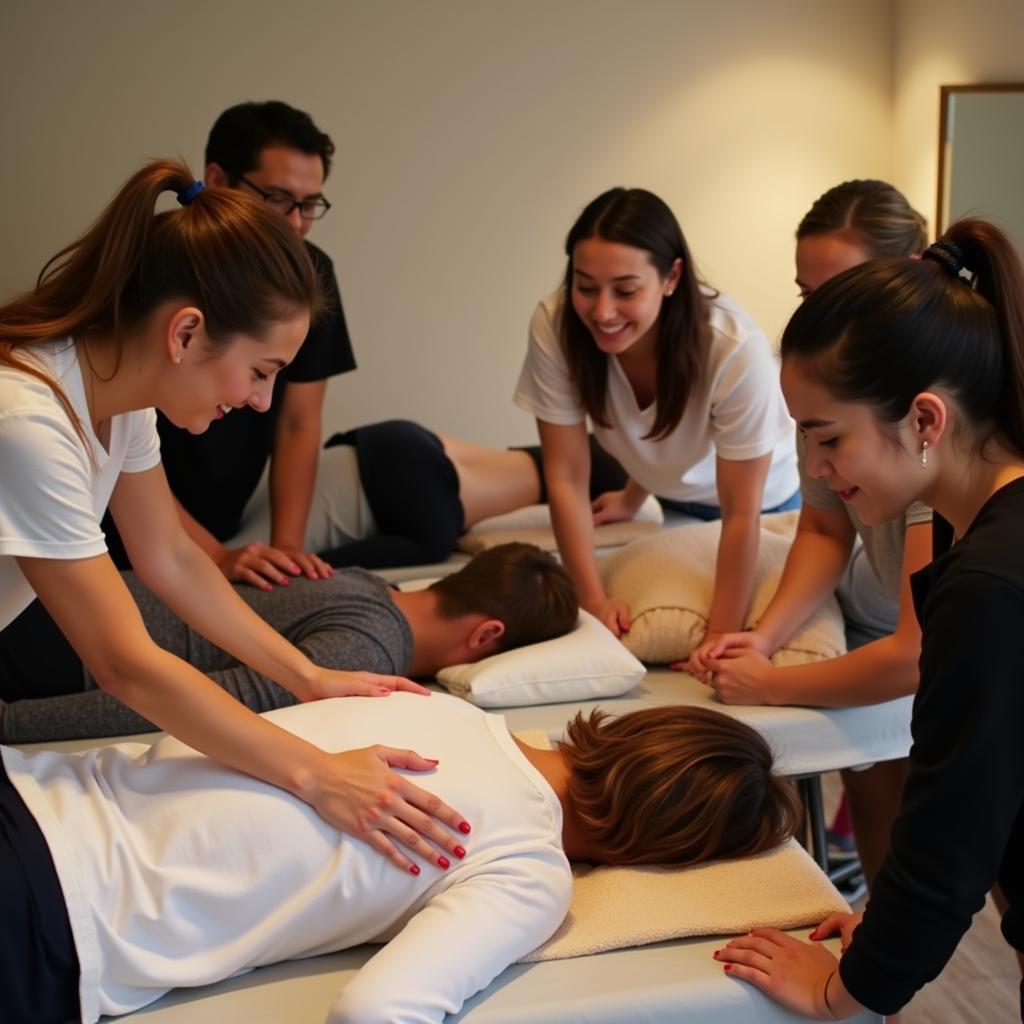Thai massage, a revered practice rooted in ancient traditions, offers more than just physical relaxation. It represents a powerful tool for fostering peace and well-being within individuals and, by extension, throughout society. This ancient art, passed down through generations, connects us to a deeper understanding of ourselves and our interconnectedness with others.
The Healing Touch: How Thai Massage Promotes Individual Peace
Thai massage, often referred to as “yoga massage,” involves a combination of acupressure, assisted yoga postures, and rhythmic compressions. This holistic approach addresses not only physical tension but also emotional and energetic blockages. By releasing these blockages, Thai massage facilitates a sense of inner peace and tranquility. The focused attention and mindful touch of the practitioner create a safe and nurturing space for deep relaxation and self-discovery. This can be particularly beneficial in today’s fast-paced world, where stress and anxiety are prevalent.
Regular Thai massage sessions can lead to improved sleep, reduced pain, increased flexibility, and a greater sense of overall well-being. When individuals experience this level of inner peace, they are better equipped to navigate challenges and conflicts in their daily lives with greater compassion and understanding.
Building Bridges: Thai Massage and Social Harmony
The principles of Thai massage extend beyond individual well-being, offering a framework for building stronger communities and fostering social harmony. The practice emphasizes compassion, respect, and a deep understanding of the interconnectedness of all beings. These values are essential for creating a peaceful and harmonious society.
By promoting empathy and understanding, Thai massage can help bridge cultural divides and foster a sense of global citizenship. The exchange between practitioner and recipient fosters a sense of trust and mutual respect, creating a microcosm of peaceful interaction that can be replicated in broader social contexts.
 Thai Massage and Social Harmony
Thai Massage and Social Harmony
Thai Massage in Modern Society: Addressing Contemporary Challenges
In today’s world, rife with conflict and division, the principles of Thai massage offer a powerful antidote to the pervasive sense of disconnection and alienation. By fostering empathy, compassion, and a deeper understanding of ourselves and others, Thai massage can help us navigate these challenges with greater wisdom and resilience. It reminds us of our shared humanity and the importance of building bridges of understanding.
The practice can also play a role in addressing specific societal issues such as stress-related illnesses, chronic pain, and the growing need for human connection. By promoting physical and emotional well-being, Thai massage can empower individuals to become active agents of positive change in their communities.
The Future of Thai Massage: A Catalyst for Global Peace
As awareness of the benefits of Thai massage continues to grow, it holds the potential to become a powerful catalyst for global peace. By promoting individual well-being and fostering social harmony, this ancient practice can contribute to a more peaceful and interconnected world. The principles of compassion, respect, and interconnectedness embedded within Thai massage offer a valuable framework for building a future where peace and understanding prevail.
Conclusion
Thai massage is more than just a physical therapy; it is a pathway to inner peace and a bridge to social harmony. By embracing the principles of this ancient practice, we can cultivate a deeper understanding of ourselves, our interconnectedness with others, and our shared responsibility for creating a more peaceful world. The healing touch of Thai massage offers a powerful reminder of the potential for peace and well-being to ripple outwards, transforming individuals, communities, and ultimately, society as a whole.
FAQ
- What are the benefits of Thai massage?
- How does Thai massage differ from other forms of massage?
- Is Thai massage suitable for everyone?
- How often should I receive a Thai massage?
- How can I find a qualified Thai massage practitioner?
- What should I expect during a Thai massage session?
- What are the origins of Thai massage?
For any assistance, please contact Phone Number: 02043854663, Email: [email protected] Or visit us at: Zone 34, Bac Giang, 260000, Vietnam. We have a 24/7 customer service team.